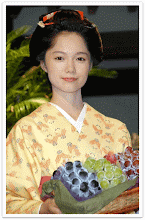Friday, January 31, 2014
This Date In History
On this date in History in 1868, Shogun Tokugawa Yoshinobu along with the Aizu Lord Matsudaira Katamori fled Osaka Castle aboard the USS Iroquois following the Shogunate defeat at the Battle of Battle of Toba-Fushimi.
Thursday, January 30, 2014
一日の画像 - Picture of the Day
Samurai re-enactors recreate the most famous act of revenge and loyalty in Japanese History. It was on this day in 1703 that the 47 Ako Ronin led by Oishi Kuranosuke carried out their revenge on Lord Kira Yoshihisa at his Edo mansion killing 16 of Kira's Retainers and injuring another 22.
We assure you no CGI Dragons, half naked English speaking women, or "Little Buddha" was involved.
We assure you no CGI Dragons, half naked English speaking women, or "Little Buddha" was involved.
Labels:
47 Ronin,
Picture of the Day,
一日の画像
Sunday, January 26, 2014
One of Japan's Most Loyal Soldiers Passes On
In a week that has brought personal tragedy to this author, another death has taken place that would be remiss for us to not mention here. On January 14th, 2014, Onoda Hiroo passed away. Of the countless stories of Japanese holdouts from WWII, it is Mr. Onoda's story that has marked one of the final curtain calls for those who fought for the Showa Emperor. Assigned to the Philippine Island of Lubang in 1944 to spy on American Forces with explicit orders to conduct guerrilla warfare with strict orders not to die, 2nd Lieutenant Onoda fought on with a small group of Imperial Japanese Army holdouts long after the Surrender in September of 1945. It would be his 30 Year War.
Over the years there had been multiple attempts by the Japanese government to bring him out of hiding. Leaflets were dropped into the jungles where he hid. Onoda refused to believe them and rendered them as enemy propaganda. Believing that America had imposed some puppet government, Onoda continued to carry on with small acts of sabotage and violent engagements with local farmers as he foraged for food to survive. Eventually, the other holdouts surrendered or were killed leaving him to carry on by himself into the 1960’s. It was during that time he watched flights of American Jets headed for the War in Viet Nam further reinforcing his belief that the war against Japan continued to wage on.
It would not be until 1974 that through the efforts of a Japanese man named Suzuki Norio who had set out to find Onoda. He managed to find Onoda but could not convince him to surrender. Suzuki took a photograph of him with Onoda as proof of his existence and returned to Japan. Once word got out, Suzuki was able to locate Onoda’s former commander Major Yoshimi Taniguchi. Mr. Taniguchi was brought to the Philippines to convince him to surrender. Upon meeting him he was released from all military duties and formally surrendered to Philippine Military officials who later brought him to Malacanang Palace in Manila so he could present his Gunto Sword to then Philippine Dictator Ferdinand Marcos who accepted his surrender and officially forgave him with an official pardon for all activities committed after 1945.
Mr. Onoda was flown to Japan to a Hero’s welcome but he soon discovered how much Japan had changed in ways he could not relate. He did not like the media attention he had received and refused both his government back pay and private donations until pressed which he then donated to the Yasukuni Shrine. As the story goes on, Onoda followed his elder brother Tadao’s lead and left Japan in 1975 for Brazil to start a cattle ranch where he would marry a year later to his wife Machie. But after reading a story about a young man who murdered his parents in Japan in 1980, he became concerned at the state of Japan’s youth and thus returned to Japan in 1984 to establish the Onoda Shizen Juku (Onoda Nature School) where he would use his skills he acquired during his 30 years in the jungle to teach Japanese youth how to survive.
Mr. Onoda lived a most remarkable life. He passed away in Tokyo from his final battle with pneumonia at the age of 91. While his story has been shared many times, it has been the backlash of worldwide anti-Japanese sentiment in recent comments posted to articles marking this soldier’s remarkable tale. He was not a crazy man. Nor could you say he was fanatical by our standards. Onoda came from a time when honor and loyalty to one’s country meant something. Men of his kind are a rare breed in this day and age and we will never see such men again. So in response to such criticisms, they lack credibility. Arm chair historians, and people with hatred for the Japanese over a war that they themselves did not suffer directly from or were even alive to have witnessed it. Damn the critics! ばか!
We at American Mishima humbly salute you!
And to the men still on patrol.
Rest in Peace.
To learn more about Onoda Hiroo,
Please Read his book No-Surrender: My Thirty Year War
Labels:
Imperial Japanese Army,
Onoda Hiroo,
Philippines,
WWII
Subscribe to:
Posts (Atom)




























